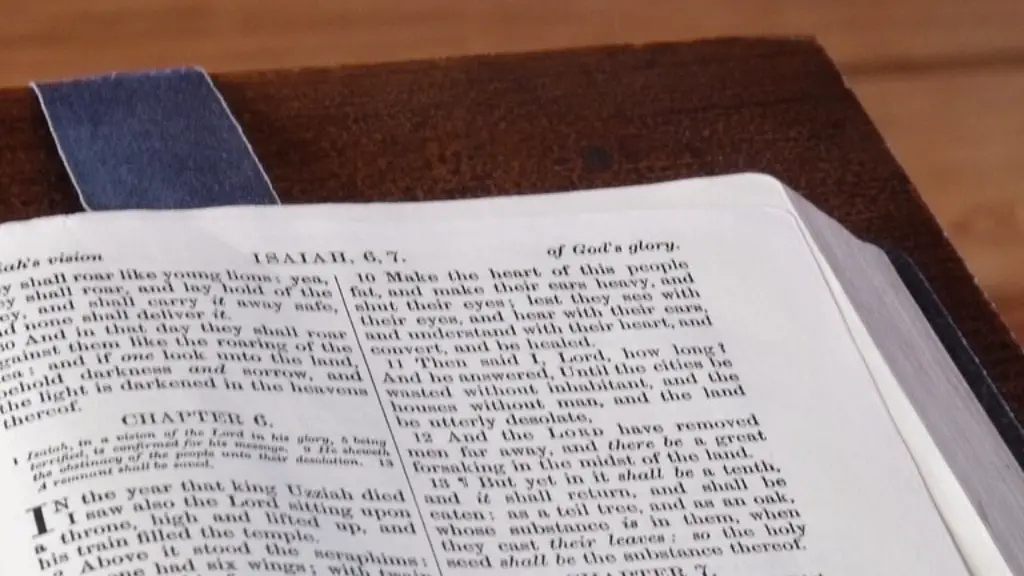King Solomon was the wisest and wealthiest ruler in the Bible. He was the son of King David and the third king of ancient Israel. He ruled over the kingdom of Israel for forty years, and is widely renowned for his wisdom, wealth, kingship and the construction of God’s Temple. Solomon is best known for his wisdom, gathered from God and other sources. He is remembered for the construction of the first temple and his religious writings, which are among the most important in the Bible.
The reign of King Solomon is considered to be a high point in the history of Israel. He is praised for his wisdom – which he used to resolve conflicts and disputes – and for his connection with God, which enabled him to build the first Jewish Temple as a way of honoring the Lord. His wealth, obtained mainly through trade and commerce, enabled the nation to thrive and expand its borders. He was a patron of culture and the arts, having commissioned the building of a great library, the Tabernacle, and other significant religious and political institutions.
Despite the legendary accounts of Solomon’s great wisdom and wealth, there is also a darker side to his reign. He was heavily swayed by foreign religions and practices, committing acts of idolatry or apostasy, as well as undertaking many building projects that were not authorized by God. Bible scholars point out that while he built the Temple, he also allowed pagan temple-building activity on the Mount of Olives. Further, he disrespected and endangered the ten northern tribes of Israel, whom he had divided and prevented from worshiping in the Temple.
King Solomon’s legacy has survived thousands of years and his legacy has been embraced by many religious faiths, including Christianity and Judaism. He is seen as a symbol of wisdom and understanding, of a capacity for governance, and of a divinely-granted knowledge. The stories of his reign and his writing endure as a lesson in wisdom, justice, and faithfulness to God. He is known for his wise sayings in Proverbs, Ecclesiastes and his Song of Songs.
Wisdom
According to the Bible, King Solomon was granted wisdom by God, which is often symbolized by his writing of Proverbs, Ecclesiastes, and Song of Songs. When the Lord appeared to him in a dream and asked what he wanted, Solomon responded, “Give thy servant an understanding heart to judge thy people that I may discern between good and bad; for who is able to judge this thy so great a people? The Lord was pleased with Solomon’s request and granted him wisdom and understanding beyond that of any other person on the earth. This wisdom enabled him to resolve disputes and judge cases. He used his God-given gifts to create a lasting legacy of wisdom and justice in the kingdom of Israel.
One of the most celebrated aspects of Solomon’s legacy is his writing. His books of Proverbs and Ecclesiastes are included in the Bible and have been a source of wisdom for generations. In Proverbs, he wrote about what it meant to have wisdom and how to use it in a wise manner. Ecclesiastes explored the meaning of life and famously stated the phrase, “to everything there is a season”. Song of Songs is a poetic love song, thought to be written to Solomon’s bride.
Legacy
Despite his flaws, King Solomon has become a symbol of wisdom, governance, and divine favor. He still stands out as one of the most important figures of the Bible, leaving behind a legacy that has endured for thousands of years. His writing provides invaluable insight into wisdom, life, and the power of prayer and faith. As a symbol of divine favor, he has been admired by people of many faiths and cultures, and his legacy is still seen in many aspects of society.
In modern times, Solomon is sometimes invoked as a symbol of wisdom and justice. Nations and institutions celebrate the legacy of King Solomon through museums and public spaces that honor his wisdom, and many countries have incorporated his writings into their legal and judicial systems. Today, Solomon is seen as a source of inspiration for those seeking wisdom and understanding of a just and holy society, and his adventures and writings are relevant to our lives today.
Religious Influence
King Solomon’s influence continues to be felt today, as his wisdom and stories continue to inspire and influence faiths around the world. Within Judaism, Solomon is venerated as a central figure in the Jewish tradition. The festival of Hanukkah commemorates the rededication of the Temple in Jerusalem by King Solomon, and is a major holiday for Jews around the world. Within Islam, Solomon is revered for his governance and for his wisdom. In Christianity, Solomon is seen as a major figure in Old Testament stories. The Bible draws clear connections between Solomon and Jesus, who was seen as a fulfillment of the righteous kingship of Solomon.
Solomon can also be seen as a figure of inspiration for those outside of faith traditions. His acts of justice and mercy remain relevant today, and his writing has provided insight and understanding for a wide range of human dilemmas. His legacy is a source of wisdom for all those who seek knowledge and understanding.
Solomon in Popular Culture
As a symbol of wisdom, courage, and power, King Solomon has made his mark in popular culture. He is mentioned and referenced in music, books, movies, and television shows. The Walt Disney movie; The Lion King features a character based on Solomon, and he has been mentioned in books such as The Lord of the Rings and The Chronicles of Narnia. He has also been referenced in popular songs such as Bob Dylan’s “Knockin’ On Heaven’s Door” and Ben Harper’s “Walk Away”. Solomon’s themes of justice, wisdom, and faith continue to find an audience in popular culture, a testament to the enduring power of his legacy.
Architecture and Buildings
King Solomon’s reign is also remembered for his grand building projects, namely the Temple and the Tabernacle. The Temple in Jerusalem, built to house the Ark of the Covenant and to serve as a space for worship, was considered one of the grandest buildings of its time and functioned as the center of Jewish worship and civilization. The Tabernacle was a smaller religious building located near the Temple, and was said to contain the model of God’s universe. It is believed to have been destroyed or re-purposed during the Hellenistic period.
In addition to religious constructions, Solomon was also involved in the building of fortresses and other structures that enhanced the kingdom’s borders and extended its influence. He was also responsible for the building of a great library, which helped to further knowledge and scholarship. These buildings and fortifications are a testament to Solomon’s legacy as an architectural master and can still be seen today in many of the cities he constructed.
Commerce and Trade
King Solomon was one of the greatest traders and merchants of his time and a key figure in international commerce and trade. He had vast trading networks that extended far and wide, enabling him to build great wealth and bring a wide range of products, foods, and materials to his kingdom. Some materials such as ivory, apes, and peacocks are mentioned in his books and are believed to have been imported from distant lands to Jerusalem. He also had trading fleets that sailed around the Mediterranean, establishing merchant relationships and building his wealth.
Through his mercantile activity, Solomon was able to strengthen the kingdom and its borders. His trading networks gave him access to new technologies and sources of wealth, enabling the kingdom to grow and prosper. His trading activities were also a major source of revenue, as they allowed him to tax shipments that came through his ports. He also established tolls in his ports, which further increased his wealth, making him one of the wealthiest kings of his time.
Conclusion
King Solomon’s reign has become the stuff of legend, remembered for his wisdom, his writing, his grand building projects, and his mercantile activities. His legacy has endured for thousands of years and has been embraced by many faiths and cultures. He is remembered as a symbol of justice, wisdom, and faith, and his writing continues to inspire generations. His legacy is still visible today in both religious and popular culture, and in the many places his life and works have had an impact.




